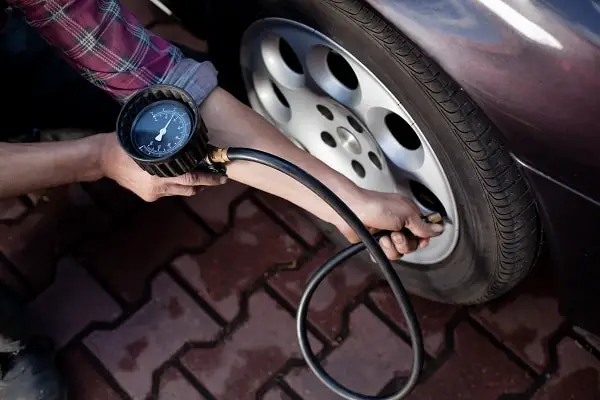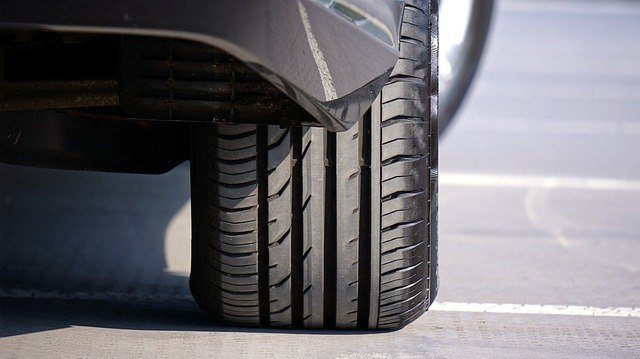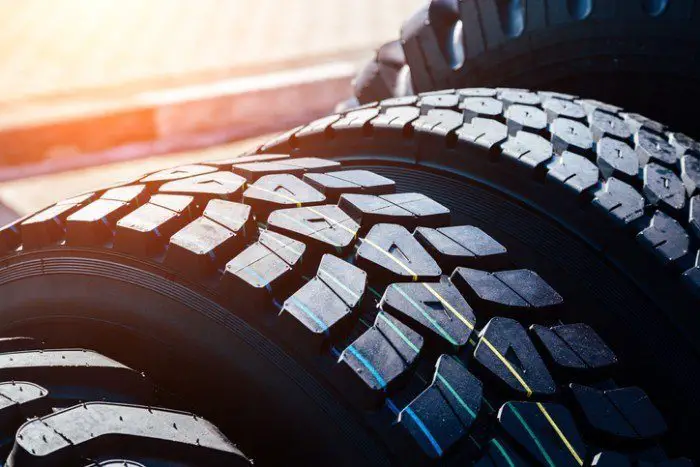Noisy tires can be a very dangerous distraction on the road.
Understanding the reasons why your tire is making excessive road noise and knowing how to quiet tire noise is an important part of keeping your vehicle running safely.
This guide will help you diagnose the source of your tire noise and offer solutions on how to quieten them.
Tire Noises & How To Fix Them:
Identifying the root cause of tire noise is the key to getting an effective solution. Buying a new set of tires is not always necessary as tire noise can be caused by something which requires a simple fix such as correcting your wheel alignment.
1. Squealing Noises
Tire squealing noises are commonly heard when you are driving around corners.
Squealing noises are caused by:
- Underinflated tires.
- Poor wheel alignment.
If your tires are making a squealing noise first ensure that they are inflated to the correct PSI. Most cars tell you on the inside of the driver door frame exactly what PSI you should inflate your wheels to.
Do not be tempted to overinflate them as this can cause other problems, including making them more likely to puncture.

If your tires are inflated correctly and are still making a squealing noise then it could be caused by your wheels not being correctly aligned. Wheel alignment problems cause your wheels to pull in slightly different directions causing the tires to rub against the road thereby preventing them from gripping the road properly and creating a squealing noise.
Fixing wheel alignment isn’t something that most of us can do at home as it requires specialized equipment to diagnose and correct so take your car to your local garage and have them correct it for you, wheel alignment adjustments shouldn’t cost more than $70 if you are having the front two tires adjusted.
Read this article if your car is squeaking when you are turning.
2. Tire Hum
Pretty much every car will experience some tire hum. Tire hum is the usual noise of your tires rolling on asphalt. However there are a few reasons why tire hum could be louder than usual:
- Having tires with a higher than needed load index will create more noise
- Tires with a greater than necessary speed rating will create more noise
- Wider tires will create more road noise

Understanding tire descriptions is important if you are going to get a tire which does not make excessive noise.
245/40R18 93W
Above is an example of a typical tire description.
To get a tire which creates minimal hum the important parts of the tire description to understand are:
- The first part 245 – this tells you the width (in millimetres) of the tire, the wider the tire the more area is in contact with the ground and the more friction and noise will be created.
- The load index number 93 – this number tells you what the maximum weight a tire can support is. Our example tire can support 1433lb / 650kg. The higher the load index number the stiffer and denser the tire will be so it is likely to create more noise. Check your car manual and use a tire with a load index rating no greater than what they recommend for the quietest tires.
- The Tire Speed Rating W – Your tire speed rating is a letter which indicates the maximum speed that your tires can safely sustain. As with the load rating, tires capable of sustaining higher speeds are stiffer and therefore create more noise. In our example, a tire with a W speed rating can sustain speeds of 168mph / 270kmph. Very few of us are ever going to drive that fast so having a tire with a speed rating that high is unnecessarily noisy. Check your car manual and get a tire with close to the minimum recommended speed rating for a quieter drive. Do not get a tire with a lower speed rating than your manual recommends as this may invalidate your insurance.
For some helping choosing a quiet tire for your vehicle check out our breakdown of the best quiet tires here.
3. Rubbing Noises
This noise sounds almost as if your tire is rubbing something on your car as it rotates. Watch the clip below for an example of this type of tire noise:
Be aware that as with all tire noise you can never be 100% certain that the noise is a tire problem. Rubbing noises, in particular, can indicate that your wheel is moving on the hub, or that there are issues with your wheel bearings or brakes or some other issue.
Don’t presume the issue is with your tire, get a mechanic to have a look!
The rubbing noise featured in the video above was caused by an underinflated run-flat-tire.
Run-flat tires have reinforced sidewalls which allows you to continue driving on them at low speeds when they have been punctured. However, doing so is likely to make the noise that you can hear in the video due to the stress placed on the sidewall of the tire.
If you have these type of tires and you can hear a rubbing noise then you may have picked up a puncture.
4. Popping/Droning Noises
At slow speeds this noise sounds a bit like your car is driving over bubble wrap, at faster speeds it sounds like a low drone. It happens when compressed air is trapped under the tire in the gaps between the tread pattern.
As the air escapes from the tread it causes the popping noise.
The worst tires for this type of noise are tires with big tread blocks, off-road tires are particularly bad for creating this sort of noise.

To fix this you simply need to invest in tires with smaller tire tread.
If you are driving an off-road vehicle and need off-road tires but want them to be quieter have a look at our best quiet off-road tire recommendations here.
As an Amazon Associate I may earn a small fee from qualifying purchases at no extra cost to you. This helps us run the site, so thanks for your support!

If I have too much weight in my tRunk, what will the tire be rubbing against
Back axle.. sound like tires are rubbing.. sounds like a lug nut rolling inside hub cap, but that’s not it.. Doesn’t sound like medal grinding.. softer grind or wheel well rubbing sound.. almost thought it was rubbing inside fender.. Can you help? Thank you… Know lights on dash showing.. 2010 Prius